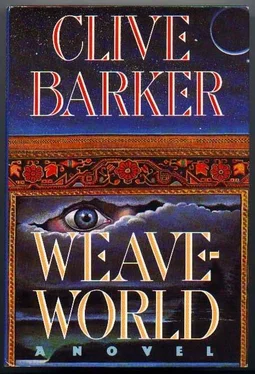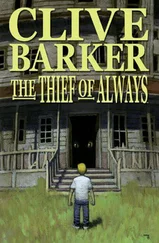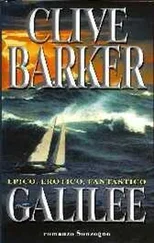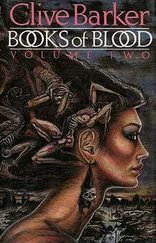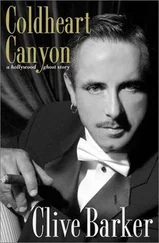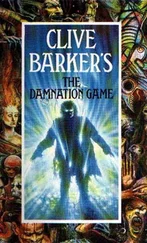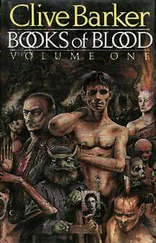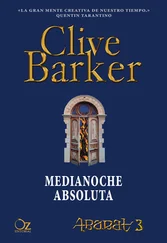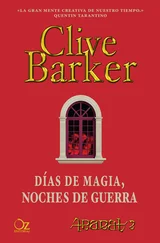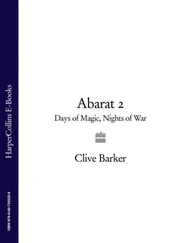Clive Barker - Weave World
Здесь есть возможность читать онлайн «Clive Barker - Weave World» весь текст электронной книги совершенно бесплатно (целиком полную версию без сокращений). В некоторых случаях можно слушать аудио, скачать через торрент в формате fb2 и присутствует краткое содержание. Жанр: Фантастика и фэнтези, на английском языке. Описание произведения, (предисловие) а так же отзывы посетителей доступны на портале библиотеки ЛибКат.
- Название:Weave World
- Автор:
- Жанр:
- Год:неизвестен
- ISBN:нет данных
- Рейтинг книги:4 / 5. Голосов: 1
-
Избранное:Добавить в избранное
- Отзывы:
-
Ваша оценка:
- 80
- 1
- 2
- 3
- 4
- 5
Weave World: краткое содержание, описание и аннотация
Предлагаем к чтению аннотацию, описание, краткое содержание или предисловие (зависит от того, что написал сам автор книги «Weave World»). Если вы не нашли необходимую информацию о книге — напишите в комментариях, мы постараемся отыскать её.
Weave World — читать онлайн бесплатно полную книгу (весь текст) целиком
Ниже представлен текст книги, разбитый по страницам. Система сохранения места последней прочитанной страницы, позволяет с удобством читать онлайн бесплатно книгу «Weave World», без необходимости каждый раз заново искать на чём Вы остановились. Поставьте закладку, и сможете в любой момент перейти на страницу, на которой закончили чтение.
Интервал:
Закладка:
But how? Her letter to him had been quite clear: she would contact him when it was safe to do so. He had no address for her; nor a telephone number.
In desperation, he turned to the only source of intelligence he had on the whereabouts of miracles. He found Virgil Gluck's card, and rang the number on it. There was no reply.
IV
THE SHRINE OF THE MORTALITIES
1
The day after Apolline's visit - with polar conditions moving down across the country, and the temperature dropping hourly - Suzanna went out to look at the sites on the list. The first of them proved a disappointment: the house she'd come to see, and those adjacent to it, were in the process of being demolished. As she studied her map, to be certain she'd come to the correct address, one of the workmen left a fire of roof-timbers he was tending and sauntered across to her.
There's nothing to see,' he said. There was a look of distaste on his face which she couldn't fathom.
‘Is this where number seventy-two stood?' she asked. ‘You don't look the type,' he replied. ‘I'm sorry, I don't - ‘
‘To come looking.'
She shook her head. He seemed to see that he'd made an error of some kind, and his expression mellowed. ‘You didn't come to see the murder house?' he said.
‘Murder house?'
‘This is where that bastard did his three kiddies in. There've been people here all week, picking up bricks -'
‘I didn't know.'
She vaguely remembered the grim headlines, however: an apparently sane man — and loving father — had murdered his children while they slept; then killed himself.
‘My mistake,' said the fire-watcher. ‘Couldn't believe some of these people, wanting souvenirs. It's unnatural.'
He frowned at her, then turned away and headed back to his duties.
Unnatural. That was the way Violet Pumphrey had condemned Mimi's house in Rue Street; Suzanna had never forgotten it. ‘Some houses,' she'd said, ‘they're not quite natural.' She'd been right. Perhaps the children who'd died here had been victims of that same unfocused fear; their killer moved either to preserve them forever from the forces he felt at work in his little sphere, or else wash his own fear away in their blood. Whichever, unless she could read auguries in smoke or rubble, there was no sense in lingering.
2
The second site, which was in the centre of the city, was neither house nor rubble, but a church, its dedicatees Saints Philomena and Callixtus, two names she was not at all familiar with. Minor martyrs, presumably. It was a charmless building of red brick and stone dressing, hedged in on every side by new office developments, the small accompanying graveyard littered and forsaken. In its way it looked as unpromising as the ruins that had been the murderer's house.
But before she even stepped over the threshold the menstruum told her that this was one of the charged places. Inside, that instinct was confirmed: she was delivered from a cold, bland street into a haven for mysteries. She didn't need to be a believer to find the candlelight and smell of incense persuasive; nor to be touched by the image of Madonna and Christ-child. Whether their story was history or myth was academic; the Fugue had taught her that. All that mattered was how loudly the image spoke, and today she found in it a hope for birth and transcendence her heart needed.
There were half a dozen people sitting in the pews, either praying or simply letting their pulses slow a little. Out of respect for their meditations she walked as quietly as the stone underfoot would allow down one of the side-aisles to the altar. As she approached the chancel rail her sense that there was power here intensified. She felt self-conscious as though somebody had their eyes on her. She looked round. None of the worshippers was looking her way. But as she turned back towards the altar, the floor beneath her feet grew insubstantial, then vanished entirely, and she was left standing on the air, staring down into the labyrinthine bowels of St Philomena's. There were catacombs laid out below; the power was sourced there.
The vision lasted two or three seconds only before it flickered out, leaving her hanging onto the rail until the vertigo it had brought with it passed. Then she looked about her for a door that would offer her access to the crypt.
There was only one likely option that she could see, off to the left of the altar. She climbed the steps, and was crossing to the door when it opened and a priest stepped through.
‘Can I help you?' he wanted to know, offering up a wafer-thin smile.
‘I want to see the crypt,' she said.
The smile snapped. ‘There isn't one,' he replied.
‘But I've seen it,' she told him, pressed to bluntness by the fact that the menstruum had risen in her as she'd crossed beneath Christ's gaze, unnerving her with its eagerness.
‘Well, you can't go down. The crypt's sealed.'
‘I have to,' she told him.
The heat of her insistence brought a stare of something like recognition from him. When he spoke again his voice was an anxious whisper.
‘I've got no authority,' he said.
‘I have,' she answered, the response coming not from her head, but from her belly.
‘Couldn't you wait?' he murmured. The words were his last appeal, for when she chose not to reply he stood aside, and allowed her to walk past him into the room beyond.
‘You want me to show you?' he said, his voice now barely audible.
‘Yes.'
He led her to a curtain, which he drew aside. The key was in the lock of the door. He turned it, and pushed the door open. The air that rose from below was dry and stale, the stairway before her steep; but she was not afraid. The call she felt from below coaxed her down, whispering its encouragement. This was no grave they were entering. Or if it was, the dead had more than rot on their minds.
3
Her glimpse of the maze beneath the church hadn't prepared her for how far below ground level it actually lay. The light from the baptistery rapidly faded as the staircase wound its way down. After two dozen steps she could not see her guide at all.
‘How much further?' she said.
At that moment, he struck a match and set it to a candle-wick. The flame was reluctant in the feeble air, but by its uncertain light she saw the priest's fretful face turned towards her. Beyond him were the corridors she'd first viewed from above, lined with niches.
There's nothing here,' he said, with some sadness. ‘Not any longer.'
‘Show me anyway.'
He nodded weakly, as though he'd lost entirely the strength to resist her, and led her down one of the passageways, carrying the candle before him. The niches, she now saw, were all occupied: caskets piled from floor to ceiling. It was a pleasant enough way to decay, she supposed, cheek by jowl with your peers. The very civility of the sight lent greater force to the scene that awaited her when, at the end of the passageway, he opened a door, and - ushering her before him - said:
This is what you came to see, isn't it?'
She stepped inside; he followed. Such was the size of the room they'd entered that the meagre candle-flame was not equal to illuminating it. But there were no caskets here, that much was apparent. There were only bones - and those there were in their thousands, covering every inch of the walls and ceiling.
The priest crossed the room and put the candle to a dozen wicks set in candelabra of femur and skull pan. As the flames brightened the full ambition of the bone-arranger's skills became apparent. The mortal remains of hundreds of human beings had been used to create vast symmetrical designs: baroque configurations of shin and rib, with clusters of skulls as their centre pieces; exquisite mosaics of foot and finger bones, set off with teeth and nails. It was all the more ghastly because it was so meticulously rendered, the work of some morbid genius.
Читать дальшеИнтервал:
Закладка:
Похожие книги на «Weave World»
Представляем Вашему вниманию похожие книги на «Weave World» списком для выбора. Мы отобрали схожую по названию и смыслу литературу в надежде предоставить читателям больше вариантов отыскать новые, интересные, ещё непрочитанные произведения.
Обсуждение, отзывы о книге «Weave World» и просто собственные мнения читателей. Оставьте ваши комментарии, напишите, что Вы думаете о произведении, его смысле или главных героях. Укажите что конкретно понравилось, а что нет, и почему Вы так считаете.
